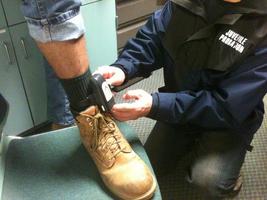Shh! Your GPS Ankle Bracelet Is Listening
Source: thecrimereport.org
When defense lawyer Fermín L. Arraiza-Navas sat down with a prospective client in San Juan, Puerto Rico last April, he casually asked the man about the Global Positioning System (GPS) ankle bracelet that he was wearing as a condition for his bail.The reply was just as casual.
“They speak to me through that thing,” the man said.
 It wasn’t the first time the lawyer encountered GPS bracelets with apparently extraordinary powers. He told the Puerto Rico Center for Investigative Reporting (CPIPR) that a previous defendant’s GPS ankle bracelet started to vibrate during a meeting with him.
It wasn’t the first time the lawyer encountered GPS bracelets with apparently extraordinary powers. He told the Puerto Rico Center for Investigative Reporting (CPIPR) that a previous defendant’s GPS ankle bracelet started to vibrate during a meeting with him.But Arraiza-Navas decided this was more than a coincidence. He cancelled the meeting and filed a motion at the Puerto Rico State Superior Court in San Juan to have the device removed.
During the court hearing on the motion, his worst suspicions were confirmed.
A Corrections Department agent, who works at the Puerto Rico Pretrial Services Office’s monitoring center for defendants free on bail, placed a GPS ankle bracelet on the court podium and made a call from the device to a technician of the SecureAlert company, which provides them at a facility in Sandy, Utah.
The technician, who was addressed through the GPS ankle bracelet—which has a phone feature—testified that, although the device is supposed to vibrate when activated from Utah, the feature could be turned on without warning.
Superior Judge Elizabeth Linares ordered the device removed within the Court’s cell area for the duration of the meeting between the defendant and his defense counsel.
But the discovery has raised serious questions about whether such technology violates the confidentiality of the attorney-client relationship—and the right to privacy—for thousands of individuals under court supervision across the U.S. whose personal private conversations could be heard or recorded without their knowledge and without a court warrant.
Civil Liberties Concerns
These concerns were shared by privacy experts and civil liberties attorneys contacted by the Puerto Rico Center for Investigative Reporting.
Puerto Rico Constitutional legal expert Carlos E. Ramos, who teaches at the Interamerican University Law School, said “the state [efforts] to listen and/or record the unauthorized conversations between a defendant with his or her lawyer through an electronic GPS-bracelet represents the most absolute and gross infringement to that person’s constitutional rights.”
“If that action is conducted through a private company, the infringement is magnified,” Ramos added.
During the court hearing, Arraiza-Navas noted that no alarm or signal was heard or seen when the electronic communication was allegedly finished.
In his motion to the court, the lawyer stated that the system’s operators had informed his office that the device was able to “activate unilaterally” from the command post and that “the conversations could be heard.”
[...]
Read the full article at: thecrimereport.org






















